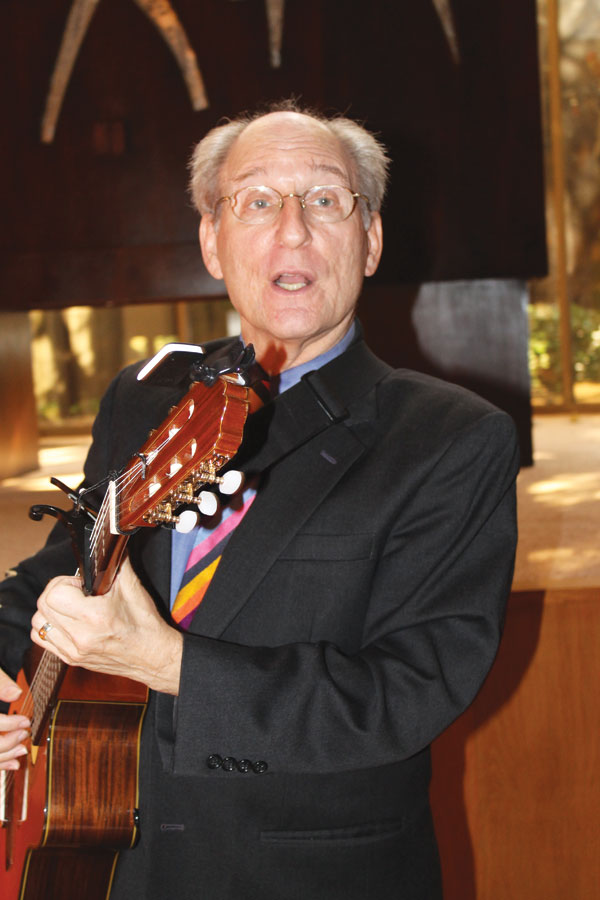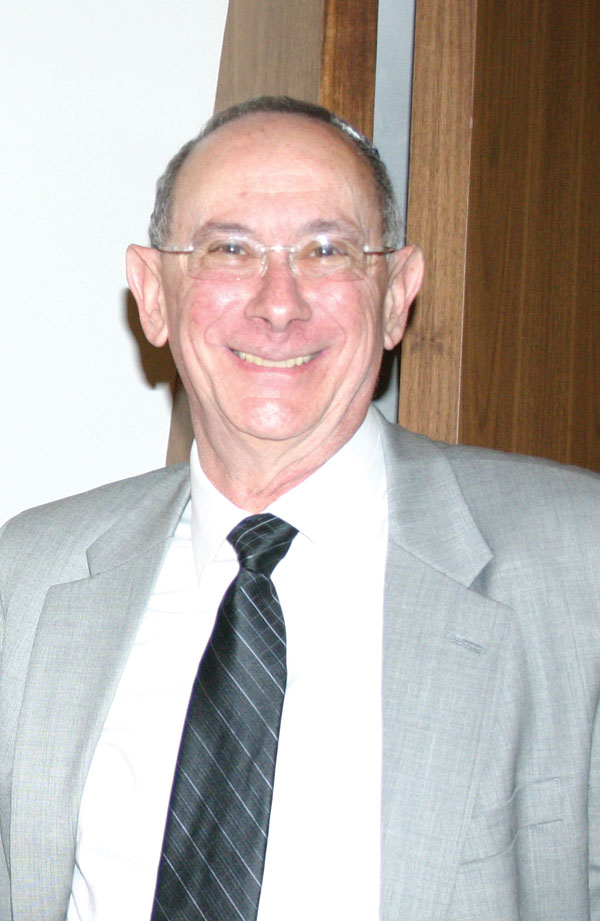Don Croll left Broadway to find more consistent work as a Jewish cantor, coming out as gay along the way
DAVID TAFFET | Staff Writer
taffet@dallasvoice.com
Don Croll has learned that his path to becoming a cantor — with an Actor’s Equity card and a Broadway run — was not that unusual. Today Croll is the cantor at Temple Shalom in North Dallas.
After graduating from Ithaca College with a major in theater, Croll was hired as a dancer for the Summer Music Theater in Charlotte, N.C. There, he earned his Equity card and next was hired by Fran and Barry Weissler for their National Theater Company.
At the time, it was one of the best children’s theater companies in the country, Croll said, adding that the Weisslers have since become what Croll calls “the revival king and queen.” Their production of Chicago has been running on Broadway since 1996.
“They liked me very much and would have used me one day,” Croll said. He said he ran into the couple at Fair Park Music Hall, at the opening of one of their shows, and Barry Weissler told him, “You could have understudied Joel Grey in our revival of Cabaret.”
Croll did make it to Broadway in a 1971 revival of On The Town with Bernadette Peters, Phyllis Newman and a pre-Chorus Line Donna McKechnie. He played the bill poster and the Congacabana master of ceremonies and was part of the singing ensemble.
“The New York Times hated us,” Croll said. Although the show got otherwise decent reviews, it closed after just 71 performances.
Croll also toured with Howard Keel and John Raitt in Man of LaMancha and danced in a production of Fiddler on the Roof. He had begun to establish a solid career — solid but not consistent.
“Then I didn’t work for eight months,” Croll said. “At the time I didn’t realize that wasn’t so terrible.”
But Croll said he hated working temp jobs. He was married at the time and contemplating a family, and he wasn’t sure he wanted to be running around the country in national tours. That’s when he decided to become a cantor, the clergy member who sings or chants the service in a synagogue.
In cantorial school Croll met others who had begun their careers on stage, and while he was studying for his career in sacred music, he came out.
“Once I came out, I never looked back,” he said.
After 10 years in New York, Croll accepted a part-time position at Beth Chayim Chadashim in Los Angeles, the first LGBT synagogue.
“When I told the head of the American Conference of Cantors, he looked at me and said, ‘Why are you ruining your career? You’ll never work in a mainstream synagogue again.’”
But a mainstream synagogue in Santa Monica hired him after members attended a service at BCC to hear him sing.
While in L.A., Croll resumed his acting career. Ironically, he was cast as a cantor in Reasonable Doubts, an early 1990s TV series that starred Mark Harmon and this year’s Black Tie Dinner speaker Marlee Matlin.
Then in Melissa Gilbert’s thriller Donor, he played a rabbi.
Croll’s partner, Jan Gartenberg, whom he met in Los Angeles, encouraged him to take a full-time job and Croll was hired by a synagogue in Albuquerque. And in 1996, Temple Shalom brought him to Dallas.
After he was hired, Rabbi Kenneth Roseman asked Croll if he’d be moving to Dallas alone. Croll said his partner would be coming and is attending nursing school. Roseman said, “Then we’ll find her an appropriate nursing school.”
Croll said, “she is a he.” Without missing a beat, Roseman replied, “Then we’ll find him an appropriate nursing school.”
Croll said the big question he was asked by Temple Shalom members about Gartenberg was, “Is he Jewish?”
He is — and his brother is the rabbi of a synagogue in Juneau, Alaska.
“I told them, ‘Jan’s more Jewish than I am,’” he said.
At Temple Shalom, Croll said he and Gartenberg are always invited to events as a couple, although, “In the beginning, some people were uncomfortable.”
In fact, a few families left the synagogue, which now has about 800 member households.
But Roseman stood behind Croll and said, “These are the values by which we stand and they shouldn’t be here if those are not their values.”
Early in his Dallas career, Croll was invited to sing at the installation of a new rabbi at Shearith Israel, the largest Conservative synagogue in Dallas. He received one hate letter.
“Every time you get up to sing, I’ll walk out,” he said the congregant wrote.
Croll showed it to the Shearith rabbi who, he said, was mortified and assured Croll he would always be welcome at their synagogue.
Croll said that his tenure at Temple Shalom has been rather noncontroversial.
“In 2003, we [he and Gartenberg] were married at Temple by five rabbis,” he said. Family, friends and lots of Temple members were there to celebrate with them.
Then in 2008, the couple were legally married in Vancouver by a gay rabbi who was new to that Canadian congregation. They were the first gay couple married at that synagogue.
And this year, Croll said, he and Gartenberg will stand together when the temple honors couples celebrating long-term anniversaries: Croll and Gartenberg will observe their 25th anniversary in November.
Croll said he’s spoken to groups a few times about his relationship, and he said parents sometimes have to explain to their children who Gartenberg is.
But after 16 years in Dallas, Croll said he is simply accepted as one of the faces of Judaism in the Metroplex.
He has also been there as a role model for the temple’s youth. One boy that he bar mitzvahed a number of years ago recently stopped by to casually tell Croll that his boyfriend was moving in with him. And Croll thinks that’s healthy and the way it should be.
Through his years in Dallas, Croll has participated in a number of events in the LGBT community. He’s performed a number of times with the Turtle Creek Chorale and has participated with Congregation Beth El Binah.
When the LGBT synagogue hosted a conference, Croll emceed the evening’s entertainment that included Estelle Getty, Roslyn Kind and local favorite Paul Williams. Last year, he represented the Jewish community at the dedication of the Interfaith Peace Chapel at Cathedral of Hope.
Croll said he isn’t at Temple Shalom to make sure things get better. He’s there making sure that everything’s OK from the beginning.
………………………………….
Beth El Binah plans High Holiday services
Congregation Beth El Binah celebrates the High Holy Days beginning Wednesday, Sept. 28 with an evening service conducted by the congregation’s new rabbi, Steve Fisch, who was hired in June.
Alan Josephson will perform as the cantorial soloist.
“We’re expecting record crowds with our new rabbi,” congregation President Diane Litke said.
“The High Holidays encourage us to reflect on where we have been, where we are and where we can be,” Fisch said. “Services are going to be fun. I’m going to try to bring a spirit of enjoyment to these beautiful days.”
The High Holy Days begin with Rosh Hashanah, which celebrates the new year. The holiday is two days long and all Jewish holidays begin at sunset. So Rosh Hashanah runs from sunset on Wednesday, Sept. 28 until sunset on Friday, Sept. 30.
Evening services begin at 8 p.m. at the Gay and Lesbian Community Center and continue with morning services at 10:30 a.m.
On Friday, the congregation will gather at Litke’s house in Richardson for Tashlich service.
The holiday season is a period of asking for forgiveness. Tashlich is performed sometime during the week between Rosh Hashanah and Yom Kippur as an act of tossing away sins. Usually bread is torn into small pieces and tossed into a running body of water as prayers are recited.
Beth El Binah traditionally gathers on the second day of Rosh Hashanah for the ritual.
Yom Kippur, the day of atonement, takes place 10 days after Rosh Hashanah. The day begins on Friday, Oct. 7 at 8 p.m. with Kol Nidre service, a somber chant that will be played on viola by congregation member Dan Sigale, who performs with the Fort Worth Symphony.
Services on Oct. 8 begin at 10:30 a.m. and continue until sunset.
A week later is the eight-day festival of Sukkot, which marks the harvest with a celebration of thanksgiving. That holiday is observed with a meal eaten in a sukkah or booth.
The sukkah represents the small temporary shelters that were built in the fields for eating and sleeping during the harvest and are decorated with fruit and vegetables.
Beth El Binah’s sukkah is built in member Wayne Wilson’s yard in Lake Highlands and seats 50 for a large potluck dinner that will be held Friday, Oct. 14.
Fisch said that after the holidays he is planning to begin a class in basic Judaism.
“The class is for people who want to convert or just learn more about Judaism,” he said.
For more information about attending any service or class, email rabbi@bethelbinah.org.
— David Taffet
This article appeared in the Dallas Voice print edition September 16, 2011.














